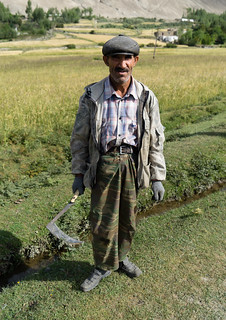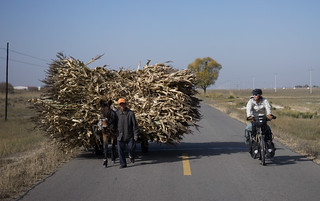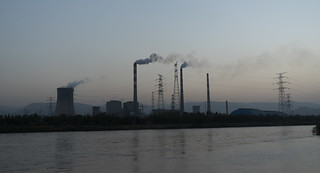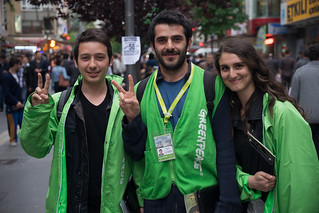Six months after leaving Istanbul, and cycling 5,500 miles (and taking a few buses, trains, boats, and trucks), we reached the eastern coast of China, thus officially crossing Asia with our bicycles. In addition to enjoying the open road and making friends with farmers, yak herders, and businessmen, we’ve talked to people we’ve met along the way about climate change. Do they hear much about the issue? Are they worried about it? In the cities, we’ve spoken with experts and advocates. In the countryside we’ve interviewed laypeople, showing them a piece of paper with questions written in the local language, asking if people think the weather has changed in their lifetime (Are winters warmer or colder than when you were a child? Are summers warmer or colder than when you were a child? Does it rain more or less?). The goal is to identify long-term trends — instead of what the weather is like this year — and we film their answers for later translation.
This is an extremely unscientific survey. Its goal is to get a firsthand impression of climate change in the regions we’re traveling through, and to use our journey to better understand the issues that we’ve focused on for much of our careers. Our travels aren’t over yet (we will cross parts South Asia next), but here are some of our observations from the journey so far:
1. Most people say it is getting warmer. While some of the interviews we’ve recorded still need to be translated (we don’t speak much Turkish, Georgian, Uzbek, Russian, Tajik, or Chinese), it’s clear that many people think it is warmer than it used to be. In Tajikistan, almost everyone we talked to said that there is now much less snow than there used to be. I’m sometimes skeptical of people’s abilities to perceive changes in the climate (I don’t easily remember what the weather was like ten years ago), but we’ve still been surprised by how consistently people across the region have said that the weather has warmed, or that there is less snow than there used to be.
2. Some people have been negatively affected, but most say the changes have not made a big difference in their lives. Although we haven’t translated some of our interviews in China, we have only two specific cases of climate change (or what is likely climate change) negatively affecting people’s lives: wheat farmers in Turkey said that warmer temperatures had hurt their crops (something that is backed up by scientific research), and people in the mountains of Tajikistan said that there is less water to irrigate in the summer when they don’t have snow in the winter, something that has become more common in recent years. (People living near the former Aral Sea said that the weather had changed and made life more difficult, but the changes in climate are mostly due to losing the Aral Sea, not global climate change.)
Mostly, though, people said that the changes had little effect on their lives. The same villagers in Tajikistan who said that less snow was bad for agriculture said less snow kept the roads open in winter, allowing more goods to arrive from the capital. And although Tajikistan is extremely poor, most people in the countryside seem to rely not on farming to survive, but on instead on family members working in Russia and sending money home — so they seemed less concerned about crop failure than we expected, as they actually end up buying much of their food. In China, although we don’t have many of the interviews translated, when we pointed to the question of whether changes in the weather had affected them, most gave us the thumbs up, as if to say “life is better now” and the changes haven’t affected them — which makes sense, as China’s rapidly growing economy has lifted hundreds of millions of people out of absolute poverty in just three decades, improving quality of life for most people.
This isn’t to say that people haven’t yet been affected by climate change here or in other parts of the world. Warmer temperatures and slightly stronger storms and droughts have made life difficult for many people. Also, sometimes people may not be aware that these changes are affecting them or stressing their society. For instance, drought likely contributed to the Syrian civil war. And fairly convincing research shows that in warmer years, people and societies are more violent. People experiencing this upheaval and violence probably wouldn’t say “it’s because of the weather,” when in fact, the weather may play a role.
Nonetheless, when we crossed the continent by bicycle and interviewed people as we traveled, we encountered few people who say the changing weather is already causing them hardship. This isn’t surprising, but it also highlights the fact that even though climate change is here, and people are noticing it, the majority of its dangerous consequences are still in the future.
3. Local environmental movements sometimes help climate action, but sometimes they don’t. The two countries we visited that are building the most infrastructure, and whose emissions are growing the fastest, were Turkey and China. In both countries, we saw countless new power plants or dams under construction (usually while cycling on newly paved roads). Both countries have seen their economies more than double in the past decade, and both look for continued growth.
In China, concern over air, water, and soil pollution, often as a result of burning coal, has put pressure on the government to reduce the country’s dependence on this particular fossil fuel. As we learned in Beijing, one third of China’s provinces already have coal reduction plans in place. Reducing greenhouse gas emissions is one reason for these limits, but the bigger reason is local air pollution.
In Turkey, the situation is different. We talked to a number of advocates, and we found that the biggest environmental movements in Turkey were 1) opposition to new hydroelectric dams, and 2) opposition to new nuclear power plants. We are sympathetic to both of these movements. Turkey is building a dam almost everywhere it can, forcibly removing people from their homes. And I might not trust the Russian companies that are building some of the nuclear power plants to do so in my backyard. Yet if these movements are successful, the result might be that Turkey builds more coal power plants instead of relying on relatively CO2-free hydro and nuclear power.
4. The international process matters. After attending the 2009 climate conference in Copenhagen, like many other people, I lost a good deal of faith in international climate negotiations. Countries made pitiful pledges to reduce emissions, and it wasn’t clear that the negotiations led to significant cuts.
However, the two countries we visited that are building the most new carbon-polluting infrastructure, China and Turkey, also seem to respond to international pressure. Turkey has very ambitious goals for installing new wind power over the next decade, and according to the people we spoke with, this is partially because they have to adopt renewable energy targets if they want to join the EU. The case for China is less clear, as some experts have said that China doesn’t respond to such pressure. Others, though, have pointed out that China cares deeply about how it is perceived by the rest of the world. And after being in the country, and learning more about “face” and how important it is, it seems clear that China’s leaders do care that they are the biggest polluter, and they do not like bad press about China. Both countries are likely doing more to combat climate change than they would in absence of an international process.
Next we are taking a train from Shanghai to Lhasa, and then taking a jeep to Nepal, where we will start biking again (China forbids independent travel in Tibet, so we are unable to cycle across the plateau unless we hire a jeep to follow us for several weeks; instead, we are taking a train to Lhasa and then a group tour to the border with Nepal). From Nepal, we will ride for three more months, crossing parts of Nepal, India, Bangladesh, and (visas permitting) Myanmar, logging another few thousand kilometers. These regions, especially India’s state of Bihar and Bangladesh, are far poorer than anywhere we’ve been, and much more vulnerable to climate change. We will share with you more of what we learn here, and you can follow us on our blog or interactive map.










